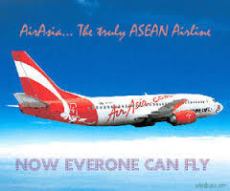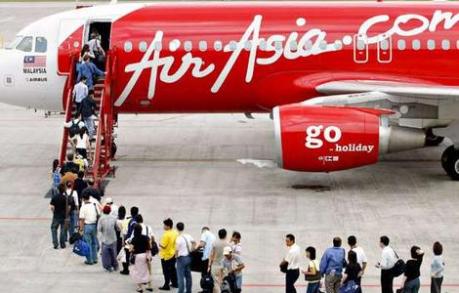
Source: http://www.airasia.com
Internet is a global system network that uses the standard Internet Protocol (IP) to serve billions of users worldwide. It is a network that consists of millions of private, public, academic, business, and government networks, of local to global scope, that are linked by a broad array of electronic, wireless and optical networking technologies. The Internet carries an extensive range of information resources and services, such as the inter-linked hypertext documents of the World Wide Web (WWW) and the infrastructure to support email.
Air Asia is one of the award winning and largest low fare airlines in Asia expanding rapidly since 2001. With a fleet of 72 air crafts, Air Asia flies to over 61 domestic and international destinations with 108 routes, and operates over 400 flights daily from hubs located in Malaysia, Thailand, and Indonesia. Today, Air Asia has flown over 55 million guests across the region and continues to create more extensive route network through its associate companies. Air Asia believes in the no-frills, hassle-free, low fare business concept and feels that keeping costs low requires high efficiency in every part of the business. Through the corporate philosophy of “Now Everyone Can Fly”, Air Asia has sparked a revolution in air travel with more people around the region choosing Air Asia as their preferred choice of transport. Air Asia has fostered a dependency on Internet technology for its operational and strategic management, and provides an online ticket booking services to traveler online.

Source: http://www.airasia.com
In today globalize economy; information technology has driven fundamental changes in the nature and application of technology in business. The implementation of information technology in its value chain provides powerful strategic and tactical tools for Air Asia, which if properly applied and used, could bring great advantages in promoting and strengthening the competitive advantages.
Air Asia has currently adopted information technologies strategically to integrate the operations and coordinate all the business and management functions. The followings are few system implementations that Air Asia has done in its marketing and sales activities as well as operation activity in the value chain.
Yield Management System (YMS). The system anticipates and reacts to the behavior of customers to maximize the revenue. Taking into account the operating cost and aids Air Asia to optimize prices and allocate capacity to maximize the expected revenues by 2 levels; seats are available at various prices in different points of time and adjusting prices for routes that have a higher demand compared to others. Results increased revenue (3-4%) by taking advantage of the forecast of the high-low demand patterns, lower prices as YMS has aided Air Asia to increase the revenue by offering higher discounts, more frequently during off-peak times while raising prices only marginally for peak times.
Computer Reservation System (CRS). It is an integrated web enabled reservation and inventory system suite powered by Navitaire Open Skies technology that includes Internet, call center, and airport departure control functionality. CRS fulfilled the unique needs of Air Asia implementing a low-cost business model to transform the business process to efficiently streamline operations.
Enterprise Resource Planning System (ERP). ERP solution is powered by Microsoft Business Solutions (MBS) on Microsoft technology platform which is implemented by Avanade consultants in 2005. With the robust ERP technology platform, Air Asia is able to successfully maintain process integrity, reduce financial month-end closing processing time, speeds up reporting and data retrieval process.
With the information technology system is fully utilized to embark the Asia market, Air Asia has proven the technology increase its sales. In 2012, Air Asia reported profit up to RM1.88 billions with an increasing of 168% profit margin from 2011.
Learn More…
eAirlines: Strategic and Tactial Use of ICTs in the Airline Industry. Dimitrious Buhalis. University of Surrey. 2004.
The future of CRM in the airline industry: A new paradigm for customer management. IBM Institute for Business Value. 2002.
AirAsia Corporate Website. http://www.airasia.com.
